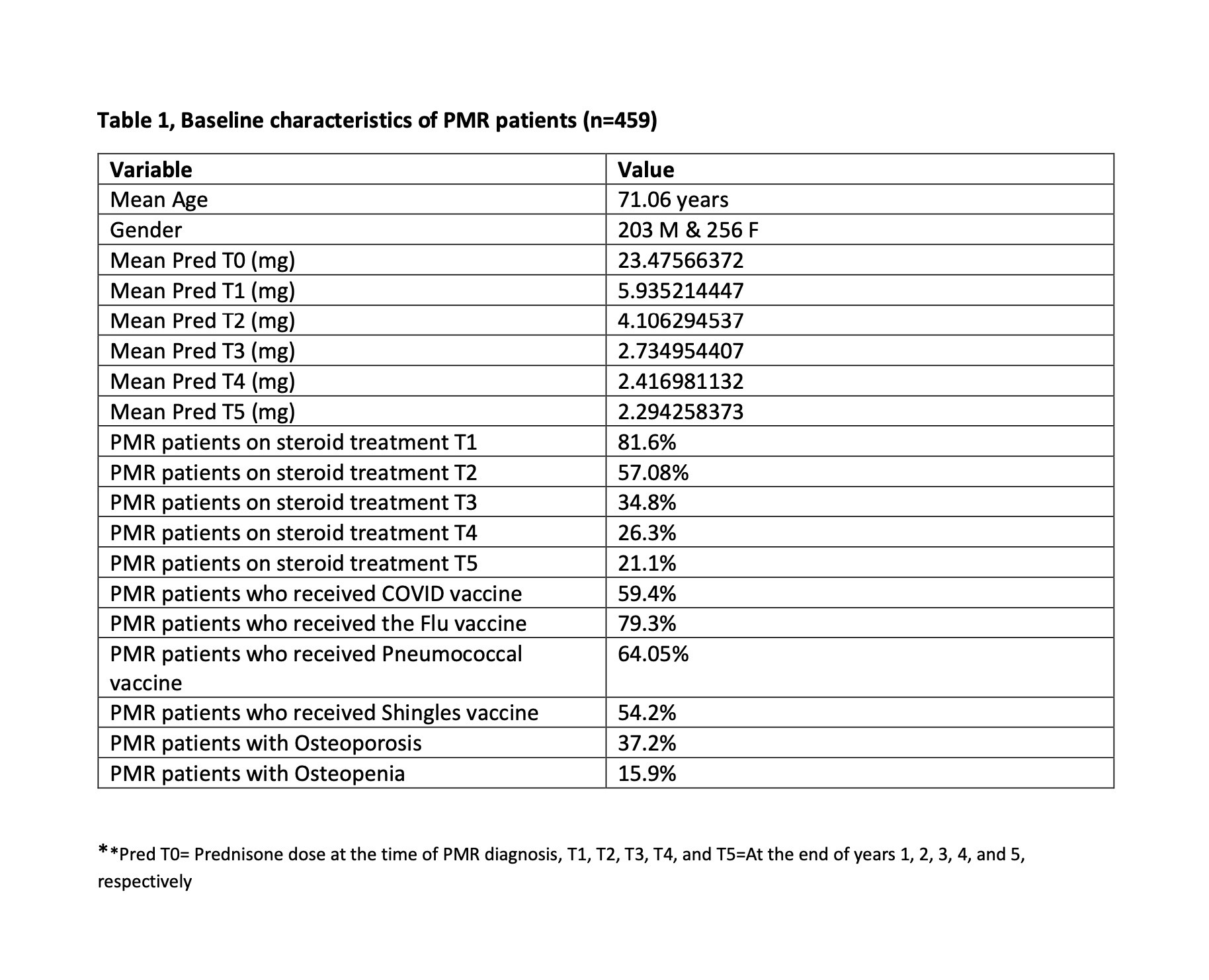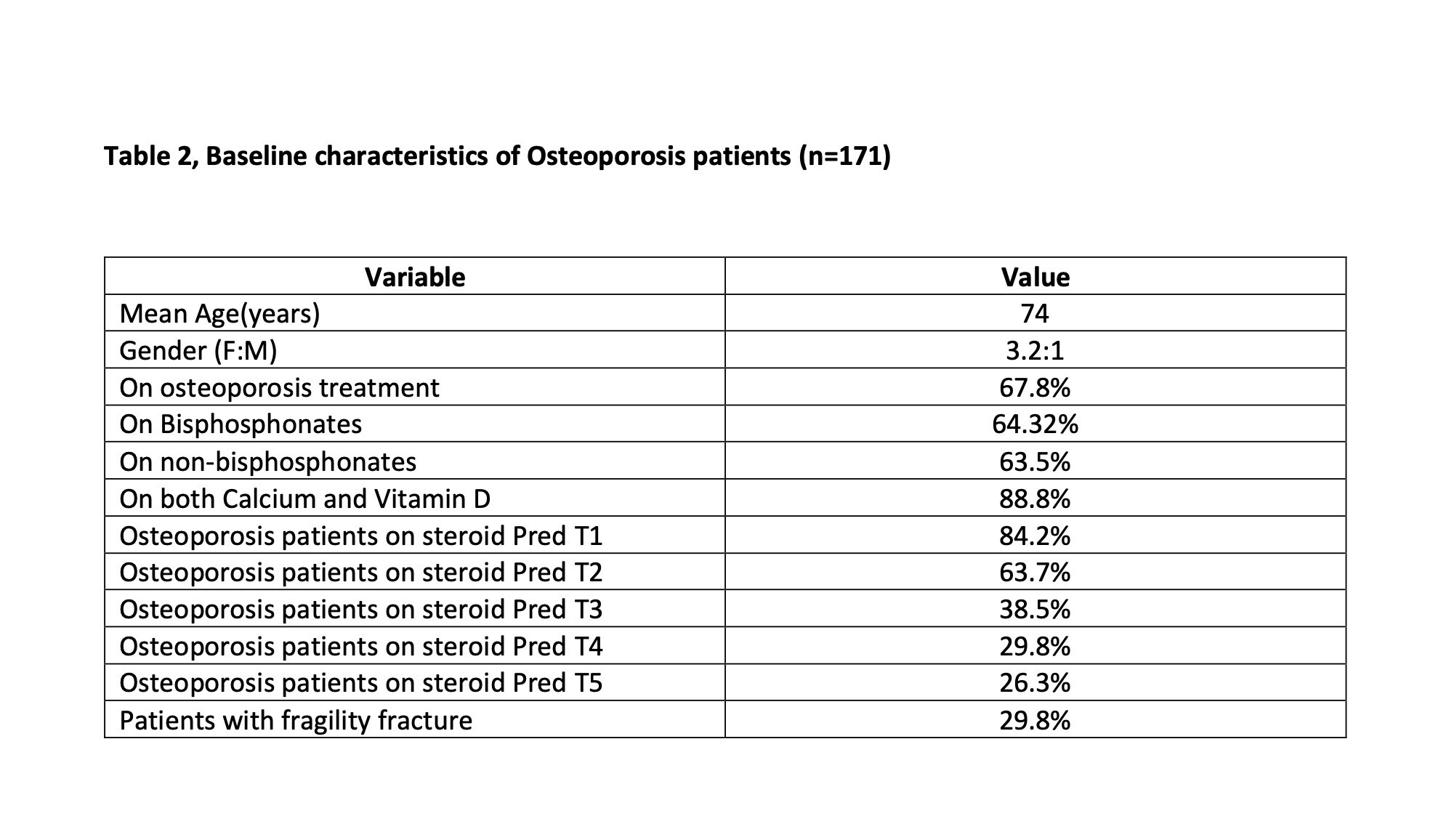Session Information
Date: Sunday, November 17, 2024
Title: Vasculitis – Non-ANCA-Associated & Related Disorders Poster II
Session Type: Poster Session B
Session Time: 10:30AM-12:30PM
Background/Purpose: Polymyalgia Rheumatica (PMR) and Giant Cell Arteritis (GCA) are systemic inflammatory disorders treated with prolonged corticosteroid therapy. Prolonged use of corticosteroids is a significant risk factor for the development of osteoporosis and subsequent fractures and also an increased risk of infections.1, 2, 3 Our previous retrospective studies revealed that the rate of steroid discontinuation in PMR patients was notably low, with only 17% ceasing steroid use after one year, increasing to only an average of 31% after two years.4,5 Osteoporosis screening and vaccinations are universal recommendations to enhance the healthcare outcomes in these patients. We analyzed the data from a cohort of PMR patients at a single academic medical center to assess the rate of osteoporosis screening and routine vaccinations.
Methods: We conducted a retrospective review of PMR patients at a rheumatology clinic, focusing on those diagnosed with PMR or PMR with GCA, and excluded patients with other rheumatological disorders. The study included 459 patients from 2011 to 2021.
Results: The patient cohort had a mean age of 71.6 years, predominantly female (1.3:1 ratio). The initial mean prednisone dose was 23.4 mg, tapering to 2.2 mg by the fifth year. After one year, 81.6% of patients remained on steroids; this number decreased to 21% by year five. Screening for osteoporosis with DXA scans was performed in 64.4% of patients; 37.3% of the total PMR patients were diagnosed with osteoporosis, and 16% had osteopenia. The majority of osteoporosis diagnoses occurred after PMR diagnosis, and 29.8% of these patients experienced fragility fractures. Only 67.6% of the osteoporosis patients received treatment for osteoporosis, primarily with bisphosphonates. Vaccination rates were suboptimal, with less than 80% receiving the flu vaccine and lower rates for other vaccines.
Conclusion: This study highlights a concerning pattern of prolonged steroid use among PMR patients, with a significant number remaining on steroids after five years. The screening for osteoporosis and vaccination rates were less than optimal, indicating improved clinical management strategies were needed. Additionally, close to one-third of the patients diagnosed with osteoporosis did not receive any treatment. The study’s retrospective nature and potential missing data from external facilities are limitations to consider.
To cite this abstract in AMA style:
Tiwari V, fang c, loomba K, Khubchandani N, shah s, Rigby W. Challenges in Managing Polymyalgia Rheumatica and Giant Cell Arteritis: Steroid Dependence and Preventive Care [abstract]. Arthritis Rheumatol. 2024; 76 (suppl 9). https://acrabstracts.org/abstract/challenges-in-managing-polymyalgia-rheumatica-and-giant-cell-arteritis-steroid-dependence-and-preventive-care/. Accessed .« Back to ACR Convergence 2024
ACR Meeting Abstracts - https://acrabstracts.org/abstract/challenges-in-managing-polymyalgia-rheumatica-and-giant-cell-arteritis-steroid-dependence-and-preventive-care/


